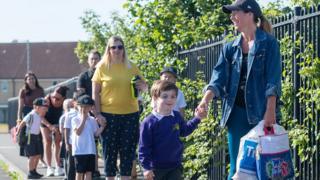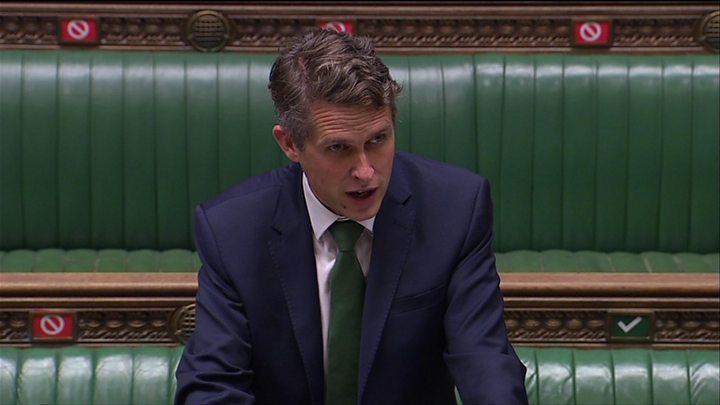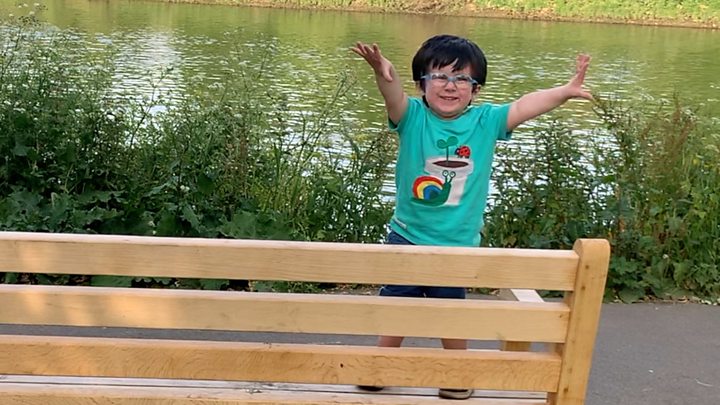 Image copyright
PA Media
Image caption
All pupils and year groups are expected to be back full time next term
Image copyright
PA Media
Image caption
All pupils and year groups are expected to be back full time next term
The government has published its safety plans for England's return to school in September - built on the principle of keeping classes or whole year groups apart in separate "bubbles".
Schools will have testing kits to give to parents if children develop coronavirus symptoms in school.
Mobile testing units may be sent to schools which have an outbreak.
Education Secretary Gavin Williamson said he wanted to "reassure parents and families" that it would be safe.
But Labour's Shadow Education Secretary Kate Green accused the government of being "asleep at the wheel" over getting children back into school full-time.
Head teachers said it would be "mind boggling" to try to keep groups of pupils apart all day in school.
What are the new rules for autumn?
The safety plans issued by the Department for Education say that "given the improved position, the balance of risk is now overwhelmingly in favour of children returning to school".

Media playback is unsupported on your device
The return will be based on separating groups of children into "bubbles" and minimising contacts between them, rather than social distancing.
It will mean:
grouping children together in groups or "bubbles", a class in primary and year group in secondary avoiding contact in school between these groups, with separate starting, finishing, lunch and break times attendance compulsory with the threat of penalty fines test and trace in place for schools regular cleaning of hands, but masks not expected for pupils or staff those with symptoms told to stay out of school no big group events like school assemblies and arranging classrooms with forward facing desks separate groups on school buses and discouraging the use of public transport pupils will be expected to continue with all their GCSEs and A-levelsAll schools will have to draw up plans for the possibility of local lockdowns.
The guidelines warn of behaviour problems being likely after a "lack of routine" for pupils out of the school for so long.
They also say that Year 7 pupils, in the first year of secondary, might have to be retaught maths and English from primary school to fill the "gaps" in their knowledge.
And parents in England who do not send their children back to school in September will face fines "unless there's a good reason for absence".
Image copyright AFP Image caption All pupils are expected to be back full time in school in SeptemberWhat happens if there is an infection or pupils with symptoms?
If a child in school has Covid symptoms they will have to be taken home straight away, and staff waiting with them will have to wear protective equipment.
If a pupil tests positive, schools will have to send home other pupils who have been in "close contact", which includes those within one to two metres for more than 15 minutes.
All schools are being promised testing kits to give to parents if pupils develop symptoms at school - and if there are two confirmed cases within 14 days, or a rise in absences because of Covid-like symptoms, this could be counted as an outbreak.

Media playback is unsupported on your device
This could mean other pupils in the class or the year group being sent home. It could escalate to the whole school site being shut down - but the guidance says such whole-school closures "will not generally be necessary".
A mobile testing unit could be sent to a school with an outbreak, which could carry out tests to see whether an infection had spread, which could check a class, a year group or the whole school.
In the event of a local outbreak, health protection teams or local authorities may advise schools to close.
Schools say the complications are 'mind-boggling'
"The logistics of keeping apart many different "bubbles" of children in a full school is mind-boggling," said Geoff Barton, leader of the ASCL head teachers' union.
"There just needs to be a sense of reality about what is possible," he said - and called on the government to have a "Plan B" if the return proved unworkable.
The National Education Union said the plans were "more based on hope than science".
Head teachers also voiced concerns about penalty fines for parents if they do not send their children back to school.
Michael Ferry from St Wilfrid's Secondary School in Crawley, West Sussex, called the threat of fines "ludicrous" and said that he will not issue them "in any shape or form".
"A significant amount of our community has been affected by the closure of Gatwick airport and if I fine parents £120, I'm effectively saying I'm taking away eight school meals vouchers - because that's what it amounts to," he told BBC Breakfast.
However, Ashley Harrold, head of secondary school Blatchington Mill School in Brighton, said schools could "overcome" challenges around capacity - although there were still "legitimate questions around safety".
How have parents reacted?
"Because of a compromised immune system I've been shielding through the pandemic - will my children be expected to return to school in September?" responded Julie to the safety plans.
"Doesn't that expose me to an unacceptable level of risk if the children pick up the virus and bring it into our home?"
Image copyright Getty Images Image caption Parents have raised questions about how pupils will stay apart on transport"As a parent of teenagers I am hugely keen to have all of my children back in a full learning environment," said Jessica.
"Life is a risk and all risk must be balanced but getting children back to normality and school life is vital to us as a family," she told the BBC.
"Schools have started opening back up and some have had to close again after children/teachers have tested positive," commented Sarah.
"Yet parents were "guaranteed" that sending children back to school was the "right" decision to make."
But Kirsty said: "Everything has got to start to go back to some sort of normal sooner or later. It's worrying but I think children need the stability of school and the social aspect of seeing their friends."
"I am father of two children. I think it's good to see back children at school. But fines on parents? I don't think so," said Azeem.
Myriam was also annoyed by the threat of fines. "Parents, who have been homeschooling for several months, should be thanked and acknowledged rather than treated this way by the government."
A shielding parent, Eric in Sussex, said about his son's school: "With 60 kids in his year group the concept of any kind of protective "bubble" is a fantasy."
"Transport to and from school is a real concern too, packed like sardines on school buses," said Geraldine.
Sticking with all GCSEs and A-levels
Exams are going to start and finish later next summer, but pupils are not expected to drop any of their GCSE or A-level subjects.
England's exams regulator, Ofqual, has drawn up plans which could slim down some of the subjects and reduce teaching time - although heads said this was "little more than tinkering at the edges" despite the scale of disruption.
There will be no significant reduction in the content of exams, or the number or length of exams taken next year.
Image copyright Getty Images Image caption Most pupils will be expected to carry on with a full range of GCSE and A-level subjectsInstead there will be a reduction in practical parts of some subjects - such as geography fieldwork, science practicals or the spoken language assessment in English.
The National Education Union said it was "unrealistic" to think this could make up for months out of school.
The guidelines for September also expect "substantial modifications" to the timetable for the first term, with an emphasis on catching up with the core subjects of maths and English.
A regular curriculum will be in place "no later" than summer term in 2021.

 5 years ago
639
5 years ago
639 

